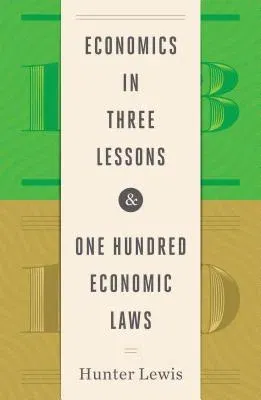Economics in Three Lessons Henry Hazlitt's 1946 book Economics in One
Lesson sold more than a million copies. It is perhaps the best selling
economics book of all time. In this volume, Hunter Lewis, a Hazlitt
admirer and student, provides a sequel and update. The central lesson of
Hazlitt's seminal work is that economic thought and policy must consider
all the consequences of an action, not just the immediate or most
visible ones. Hazlitt is right that this is the kernel of all good
economics. Lewis covers this theme and also introduces two more lessons:
how a free and uncontrolled price system creates prosperity and how a
controlled or manipulated price system creates only crony capitalist
corruption and, ultimately, poverty and economic failure. The great
merit of this volume is its simplicity. Anyone can read and understand
it. It is an ideal introduction to economics. One Hundred Economic Laws
In this groundbreaking volume, Lewis does what no one has attempted to
do, at least not for many decades. It collects in one place some of the
most important laws of economics. Everyone understands the importance of
understanding the laws of physics and other natural sciences. Are there
also laws of economics? Can understanding them also make our lives
better? This volume answers with a resounding yes to both questions. We
need the laws of economics to help guide our choices and actions in a
very uncertain world. We also need them to protect us from the "thinkers
for hire" who, paid by special economic interests, try to persuade us to
ignore reality. This short book is also a complete course in economics.
Unlike the dry-as-dust and often irrelevant textbooks forced on high
school and college students, it is written in a lively and even
sparkling style.

